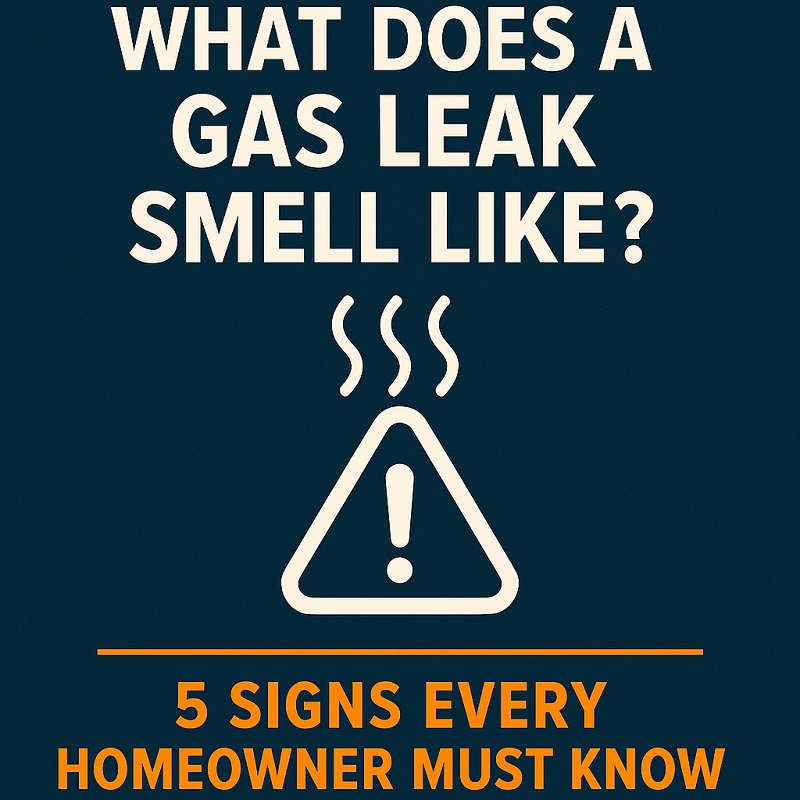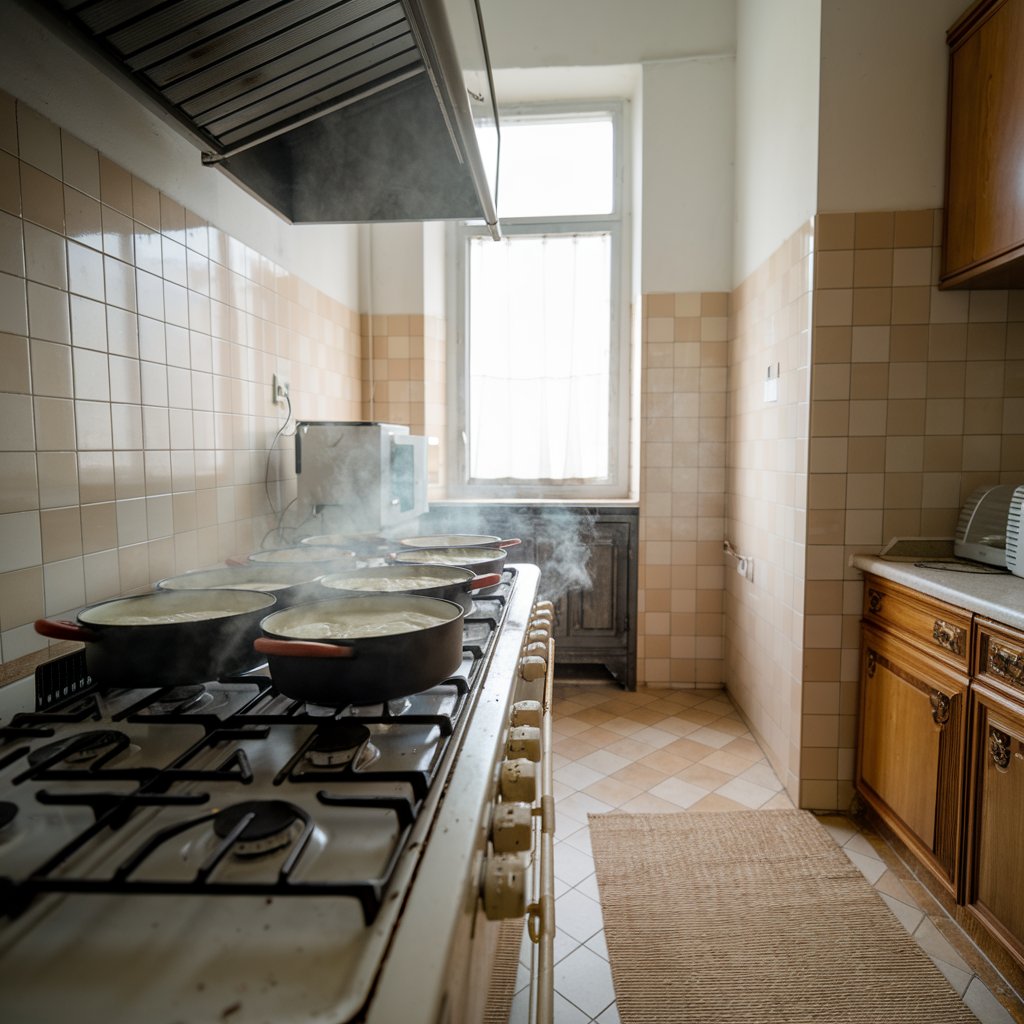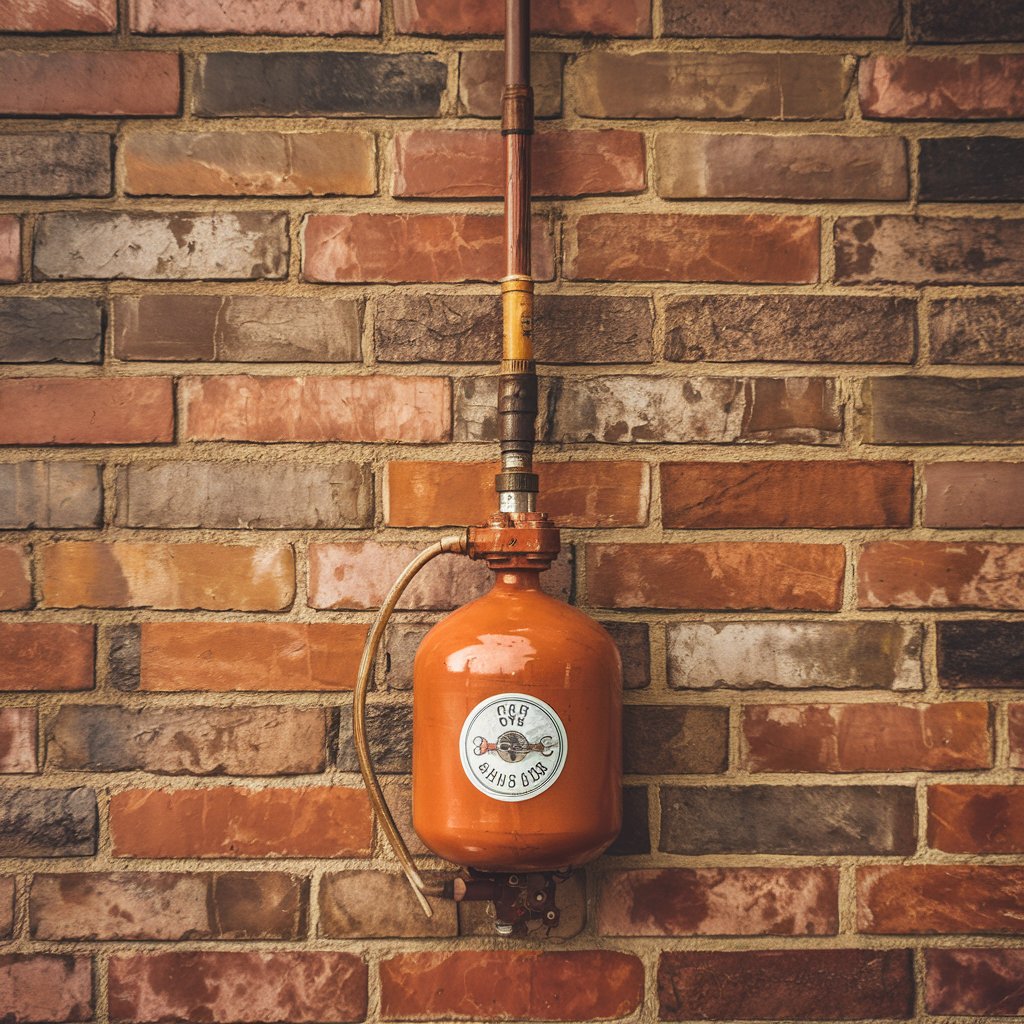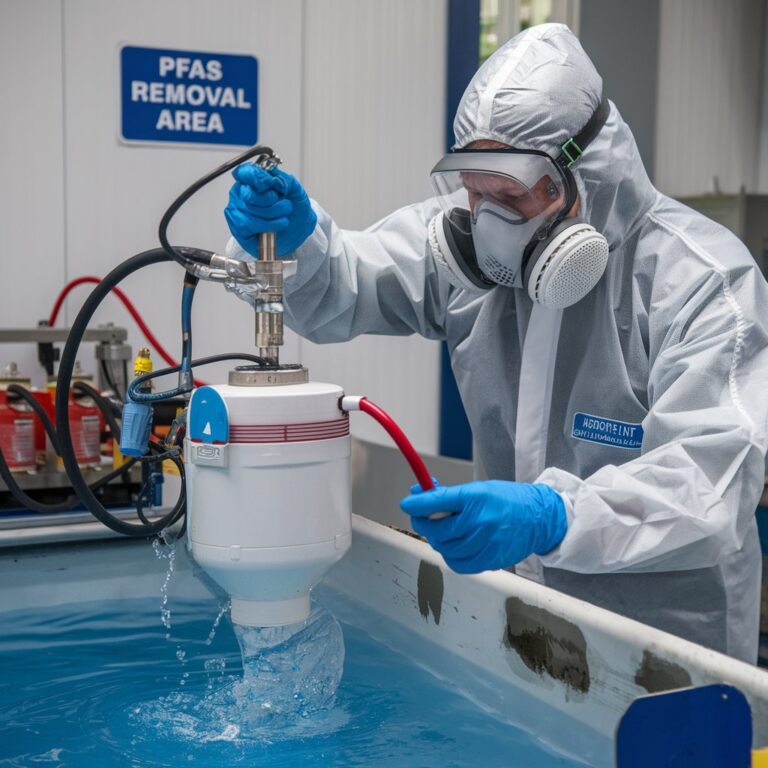What does a gas leak smell like? It typically smells like rotten eggs, sulfur, or burnt garlic. This distinct odor comes from a chemical called mercaptan, added to natural gas for safety reasons. Recognizing this smell can be the first crucial step in preventing fires, explosions, or serious health hazards.
Imagine walking into your kitchen to prepare dinner, and a strange, unpleasant odor hits you. Is it spoiled food, a sewer issue, or something far more dangerous—like a gas leak? For homeowners, especially housewives managing busy households across the USA, spotting the early signs of a gas leak can mean the difference between safety and disaster. This guide will explain everything you need to know to protect your family and home.
What Does a Gas Leak Smell Like?
Natural gas is odorless in its raw form, but for safety, utility companies add a chemical called mercaptan to give it a distinct smell. This odor is often described as:
- Rotten eggs: A sulfur-like stench that’s sharp and unmistakable.
- Sulfur or skunk: Some perceive it as a faint skunk-like smell, especially at lower concentrations.
- Garlic-like: In rare cases, the smell may resemble burnt garlic or onions.
The intensity of the smell depends on the leak’s size and ventilation. A faint odor might indicate a small leak, while a strong smell signals an immediate emergency. According to the U.S. Consumer Product Safety Commission (CPSC), recognizing this smell is the first line of defense against gas-related accidents. For housewives, who often spend significant time at home, being attuned to this odor is crucial, especially in areas like kitchens or laundry rooms where gas appliances are common.
Why It Matters: Gas leaks can lead to carbon monoxide poisoning, fires, or explosions. The National Fire Protection Association (NFPA) reports that gas leaks contribute to thousands of home fires annually. Knowing what a gas leak smells like empowers you to act before a minor issue becomes catastrophic.
Types of Gases and Their Unique Smells
When strange odors fill a home, it’s important to know the difference between a dangerous gas leak and other common household smells. Here’s how to tell them apart:
Natural Gas: Naturally odorless, natural gas is mixed with a chemical called mercaptan to create that unmistakable rotten egg or sulfur smell. This strong odor acts as an immediate warning sign of a leak.
Propane: Like natural gas, propane is infused with a sulfur-like scent, but it tends to have a slightly sweeter, skunky smell. Propane is often used in rural homes with outdoor tanks, so if you live outside city limits, stay alert for this similar—but distinct—odor.
Carbon Monoxide: Unlike natural gas or propane, carbon monoxide (CO) is completely odorless. It can’t be detected by smell alone, which is why installing a CO detector is crucial in every household. Many people mistakenly associate any gas smell with CO poisoning, but CO requires special alarms to identify.
Sewer Gas: If you notice a musty, sewage-like smell—especially near drains—it’s likely sewer gas, not a gas leak. Sewer gas smells unpleasant but typically lacks the sharp sulfur odor of natural gas. According to the Environmental Protection Agency (EPA), while sewer gas is less explosive than natural gas, prolonged exposure can still cause health issues like headaches or nausea.
Why It Matters: Recognizing the difference between gas odors can prevent unnecessary panic and help housewives and homeowners act quickly when a true leak occurs.
5 Signs of a Gas Leak Every Homeowner Must Know
Beyond the telltale smell, gas leaks often come with other warning signs. Here are five critical indicators to watch for, tailored to help homeowners stay vigilant.
-
Distinct Rotten Egg Smell
The most recognizable sign of a gas leak is the rotten egg odor caused by mercaptan. This additive is deliberately strong to ensure even small leaks are detectable. However, not everyone perceives it the same way—some may find it faint or mistake it for other household odors.
- Where to Check: Focus on areas near gas-powered appliances like stoves, water heaters, or furnaces. Outdoor gas meters are also common leak points.
- Fact: The Centers for Disease Control and Prevention (CDC) notes that mercaptan is non-toxic but serves as a critical warning for toxic natural gas or propane.
- Tip for Housewives: If you notice a faint sulfur-like smell while cooking or doing laundry, turn off gas appliances and ventilate the area before investigating further.
-
Hiss or Whistling Sounds Near Gas Lines
A gas leak often produces audible clues, especially if gas is escaping under pressure. You might hear:
- Hissing: A soft, continuous sound near pipes, valves, or appliances.
- Whistling: A higher-pitched noise indicating a significant leak.
- Where to Listen: Check near gas meters, exposed pipes in basements, or connections to appliances like dryers. The American Gas Association (AGA) recommends routine inspections of these areas.
- Fact: High-pressure leaks are more likely to produce sounds, but even small leaks can be audible in quiet environments.
- Tip for Housewives: If you hear unusual noises while cleaning or organizing near gas lines, don’t ignore them. Open windows and call a professional immediately.
-
Physical Symptoms (Dizziness, Nausea, Fatigue)
Exposure to natural gas or carbon monoxide (a byproduct of incomplete combustion) can cause alarming health effects, especially in enclosed spaces. Common symptoms include:
- Dizziness or lightheadedness
- Nausea or vomiting
- Fatigue or weakness
- Headaches or confusion
- Difficulty breathing
- Who’s at Risk: Children, elderly family members, and pets are particularly vulnerable, as they may show symptoms faster. The CDC warns that prolonged exposure can lead to unconsciousness or death.
- Fact: The Environmental Protection Agency (EPA) estimates that carbon monoxide poisoning from gas leaks affects thousands of Americans yearly.
- Tip for Housewives: If you or your family experience these symptoms alongside a suspicious smell, evacuate immediately and seek fresh air. This is especially critical during winter when homes are sealed tightly.
-
Dead or Wilting Houseplants
Gas leaks can disrupt oxygen levels in your home, affecting living things like houseplants. If your once-thriving pothos or peace lily starts wilting unexpectedly, a gas leak could be the culprit.
- How It Happens: Natural gas displaces oxygen, starving plants of the air they need. Propane leaks can have similar effects.
- Fact: The University of California Agriculture and Natural Resources notes that gas leaks are a lesser-known cause of plant distress in homes.
- Where to Check: Look at plants near gas appliances or in poorly ventilated areas like basements.
- Tip for Housewives: If you’re a plant enthusiast, treat sudden plant death as a red flag, especially if paired with other signs like odors or sounds.
-
Visible Dust or White Clouds Near Gas Lines
In rare cases, a high-pressure gas leak can stir up dust or create a visible cloud. This happens when gas escapes forcefully, disturbing particles or condensing moisture in the air.
- What to Look For:
- Dust clouds near gas meters or exposed pipes.
- A white, misty haze that dissipates quickly.
- Fact: The NFPA states that visible signs are more common with large leaks, which are highly dangerous and require immediate action.
- Where to Check: Inspect outdoor gas meters or indoor pipelines, especially in utility rooms.
- Tip for Housewives: If you notice dust or haze while cleaning or checking your meter, avoid creating sparks (e.g., flipping switches) and evacuate.
Quick Gas Leak Response Checklist
- Smell rotten eggs? Don’t flip lights or appliances!
- Evacuate everyone, including pets.
- Call 911 or your gas company emergency line once outside.
- Stay outside until professionals declare it safe.
Bonus Tip:
Store emergency contacts on your fridge and phone for quick access.
Indoor vs. Outdoor Gas Leak Smells
| Factor | Indoor Leak | Outdoor Leak |
| Smell Strength | Stronger, persistent | Faint, might dissipate faster |
| Additional Signs | Health symptoms (headache, nausea) | Dying plants, dust clouds |
| Risk | Immediate risk to life and property | Still dangerous, but slower spread |
Always treat both with urgency!
Why Gas Smells Stronger in Winter
- Windows are usually closed, trapping smells.
- Heaters increase indoor gas usage.
- Cold air density holds odors closer to the ground.
Result: You’re more likely to detect leaks inside during cold months.
What to Do If You Suspect a Gas Leak
If you detect any of these signs, act quickly to protect your family. Follow these steps, backed by the CPSC and NFPA:
- Evacuate Immediately: Leave the house with all family members and pets. Don’t stop to open windows or investigate.
- Avoid Sparks: Don’t use light switches, phones, or appliances, as they could ignite gas vapors.
- Call for Help: Once outside, call 911 or your gas company’s emergency line (e.g., National Grid or PG&E provide 24/7 hotlines).
- Stay Out: Don’t re-enter until a professional confirms it’s safe.
Next Steps:
- Contact a Plumber: Schedule a licensed plumber to inspect and repair gas lines.
- Install Detectors: Invest in carbon monoxide detectors and gas leak alarms for ongoing protection. The EPA recommends placing detectors near bedrooms and gas appliances.
- Prevention: Schedule annual gas line inspections and maintain appliances to reduce risks.
For Housewives: Keep a list of emergency contacts (plumber, gas company) on your fridge or phone for quick access. Teach older children what to do in case of a gas leak to ensure everyone stays safe.
Common Myths About Gas Leaks
| Myth | Reality |
| “All bad smells mean gas leaks.” | Sewer or mold smells are different—mercaptan smells distinctly sulfur-like. |
| “Gas leaks cause immediate symptoms.” | Some leaks cause slow, chronic symptoms—stay vigilant. |
| “Only old homes get leaks.” | New homes are also at risk due to faulty installations. |
Conclusion
Gas leaks are serious but manageable risks when you know what to watch for. Recognizing the distinct smell of rotten eggs, along with hissing sounds, health symptoms, dead houseplants, or visible dust, can make the difference between danger and safety.
For housewives and homeowners across the USA, staying alert near kitchens, laundry rooms, and gas meters empowers you to protect your loved ones.
Don’t wait for a crisis—schedule a gas inspection today, install detectors, and bookmark this guide for easy access.
Have you ever smelled something suspicious at home? Drop a comment below to share your story or ask questions—we’re here to help!





